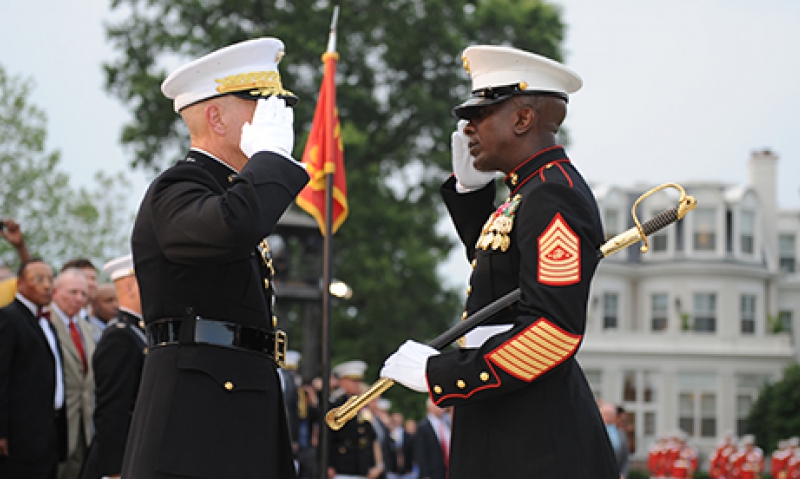
Secretary of Defense Leon Panetta told the House Armed Services Committee that he supports the current military retirement system.
Testifying before the House Armed Services Committee (HASC) on Oct. 13, Secretary of Defense Leon Panetta said that no decisions had yet been made by the Department of Defense (DoD) on future changes to America's military retirement system, but that he "can't break faith with those in the service ... we're going to stand by the promise that was made to them .... we are going to protect those who are in the service today."
Army Gen. Martin Dempsey, chairman of the Joint Chiefs of Staff, added that he rejected characterization of the military retirement system as "gilt-edged," and that it should not be compared to retirement systems in the private sector.
Panetta and Dempsey made their remarks in response to a question by Rep. Silvestre Reyes of Texas, who had recently met with military families and heard their concerns about proposals by the Defense Business Board to reduce military retirement benefits. Reyes asked if America had arrived at the point where reforming military retirement was necessary.
Later in the hearing, Rep. John Kline of Minnesota spoke about "the tyranny of personnel costs" and praised Panetta's pledge to "keep the faith with those who have served." He mentioned his recent visit to Ft. Lewis, Texas, where servicemembers and their families worried that their retirement benefits "were going to be yanked away."
Then Kline asked Panetta and Dempsey if they would state, for the record, that "you are adamantly opposed to changing the currently military retirement system." While Dempsey said he was "adamantly opposed" to any current proposals, he was also "open to look at changes" in the future.
Panetta replied to the same question: "Absolutely. We cannot break faith" with armed forces serving today and deploying overseas in America's defense.
Rep. Chellie Pingree of Maine also voiced her opposition to any plan that sought to reduce benefits for the country's military retirees.
In his opening remarks to the committee, Panetta said that "we are at a turning point ... with regard to the military as a whole" because of DoD's requirement to cut more than $450 billion from its budget over the next decade.
DoD is confronting such a monumental fiscal challenge, Panetta said, at the same time America continues to face global terrorism, nuclear proliferation and cyberattacks. Therefore, he said any budget-cutting decisions must be based on key guidelines:
• America must maintain the finest and best military in the world.• Congress must avoid creating a "hollow force" with excessive budget cuts.• A balanced approach must be taken that examines all areas of the DoD budget for potential savings, including procurement, personnel and modernization efforts.
"All of that needs to be on the table if we're going to do a responsible job here," Panetta said. "We cannot break faith with our men and women in uniform."
One way DoD plans to reduce spending is to achieve the ability to audit its entire budget by 2014 - which it is currently unable to do. Panetta said a plan will be developed in the next 60 days, and that such audits would track spending, identify waste and improve the way the Pentagon does business.
"We owe it to the taxpayers to be transparent and accountable," Panetta said. He also warned the committee that any automatic, across-the-board cut to defense spending "is a blind, mindless formula" that is sure to weaken America's military.
"What I'm urging the supercommittee to do, is do the right thing," Panetta said, "and make the right decisions for the federal government's entire budget, not just the one-third that includes the DoD budget and other discretionary spending. If you're going to be responsible in dealing with the deficit, you've got to consider mandatory programs."
Gen. Dempsey then made some brief comments to the committee, noting that more than two million servicemembers had deployed to Iraq, Afghanistan and other overseas locations during the past decade.
In that time, Dempsey said the military had developed its ability to adapt and to learn. Some lessons learned are that we are living in an "increasingly competitive security environment;" that "shared command responsibilities" with our allies "matter more than ever;" and that America wants to expand the "envelope of cooperation."
Dempsey said the country's armed forces are "truly outstanding but must be cohesive." Innovation will continue to be instrumental in the future of America's military, but "leadership remains at the core of our military profession." He told the committee that indiscriminate budget cuts will cause substantial harm to our forces. "These choices need to be deliberate and precise."
Meanwhile, on Oct. 13, The American Legion National Executive Committee passed a resolution encouraging Congress and the White House "to cease all efforts to reduce the defense budget from its current level."
- Legislative

